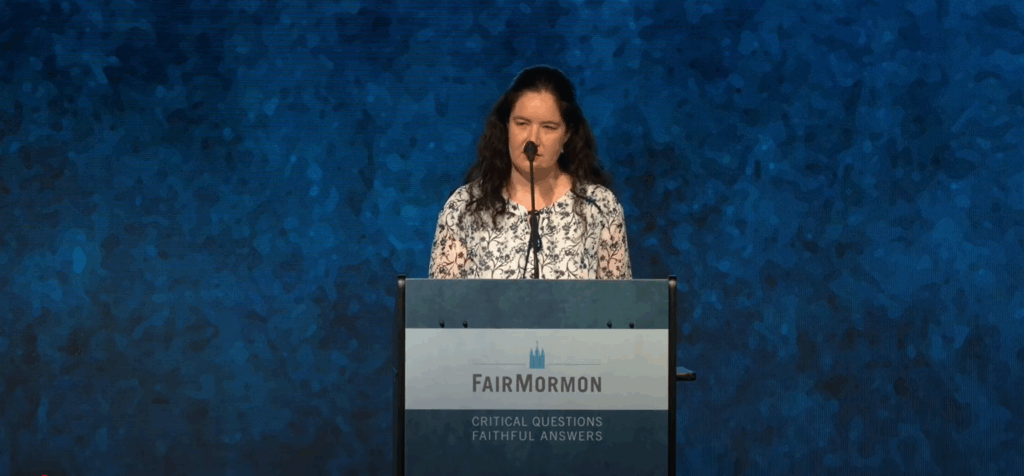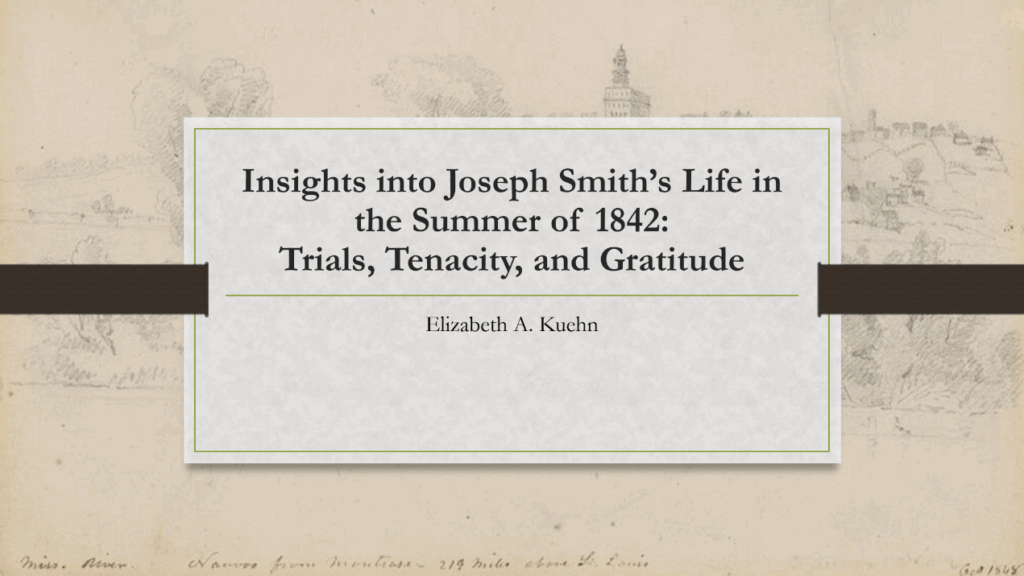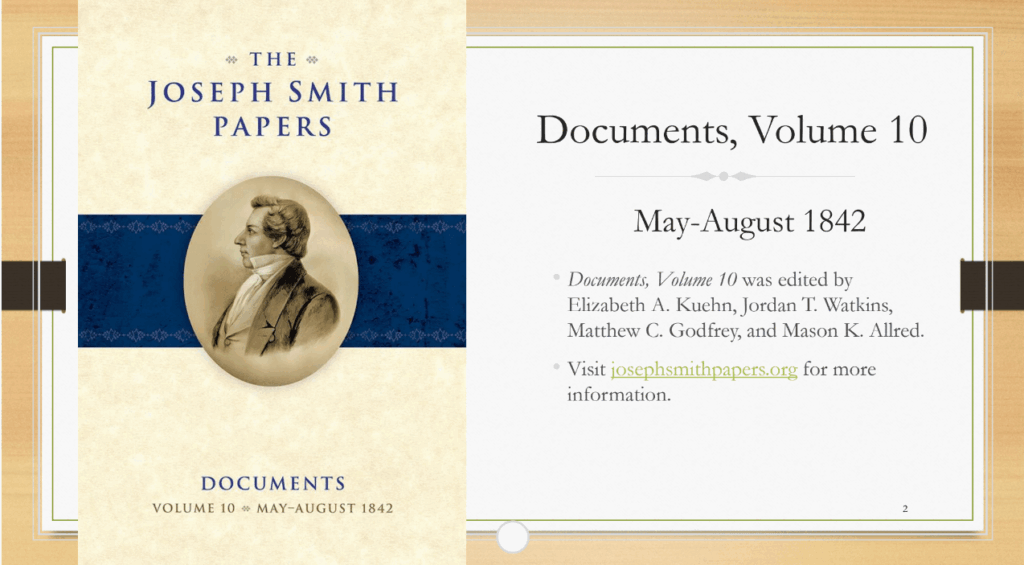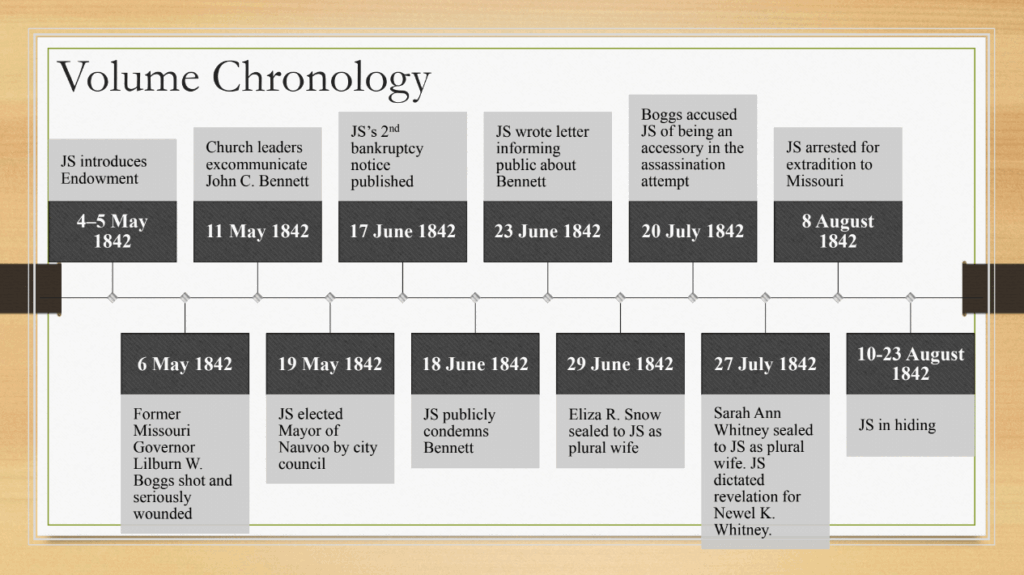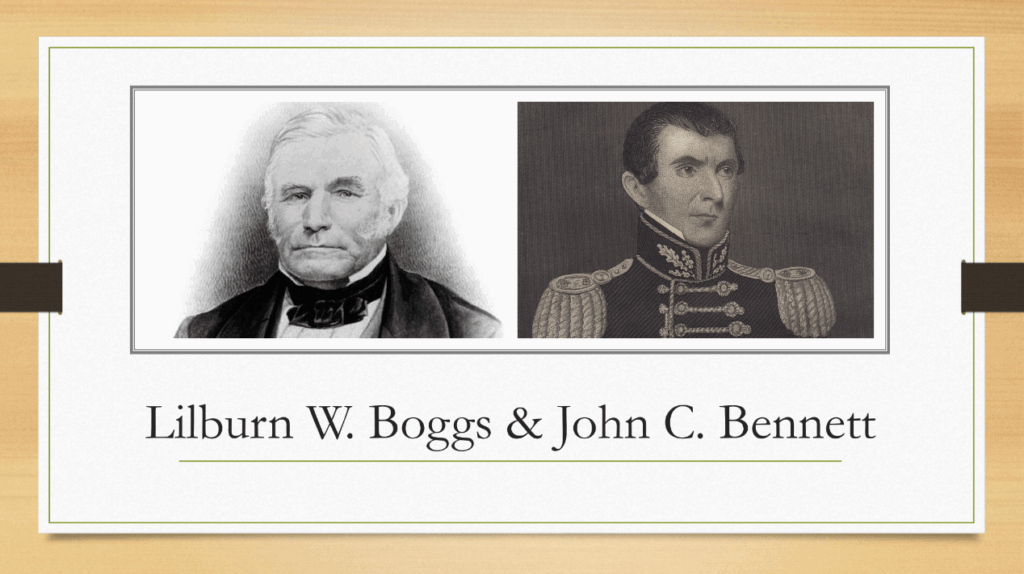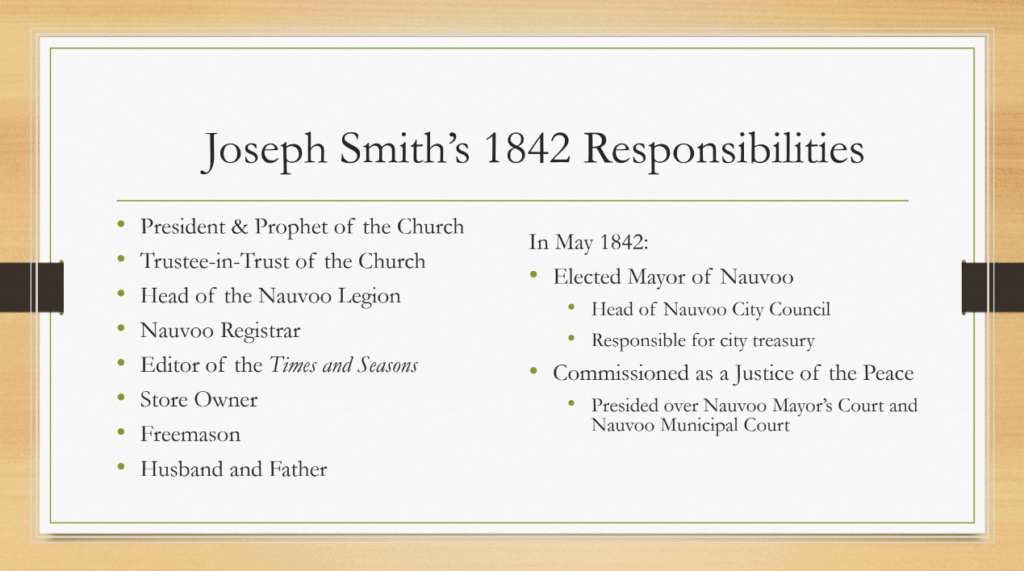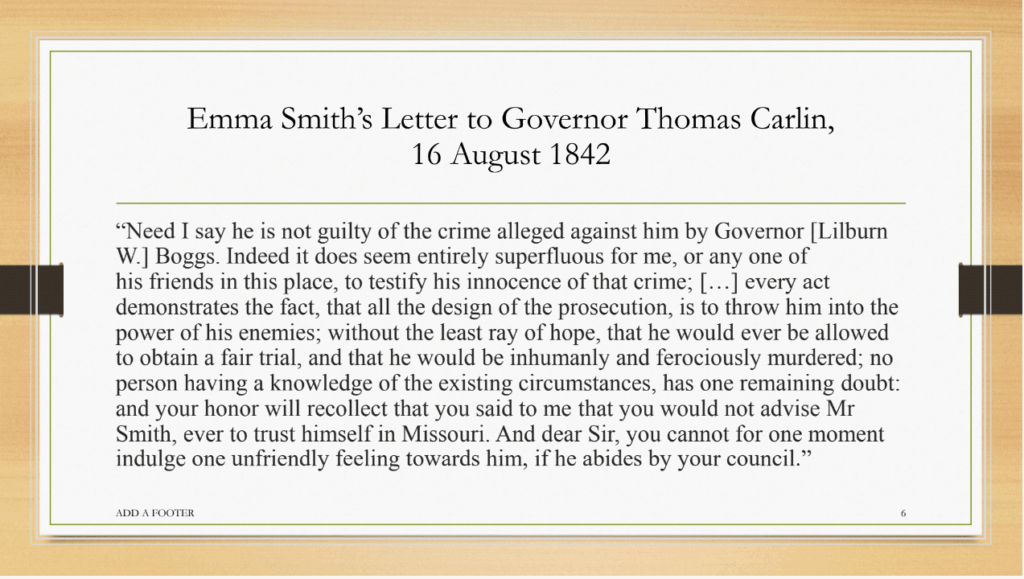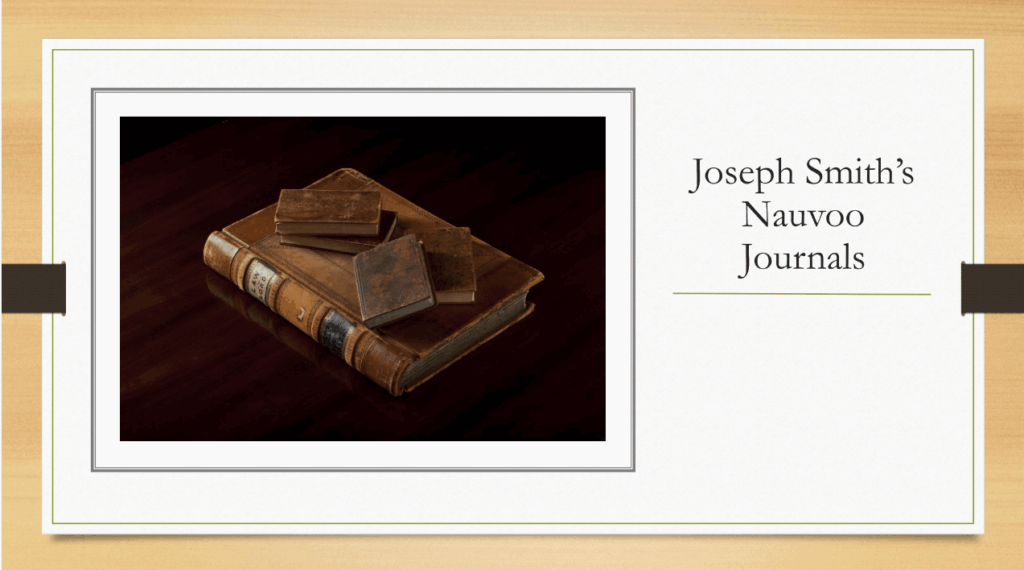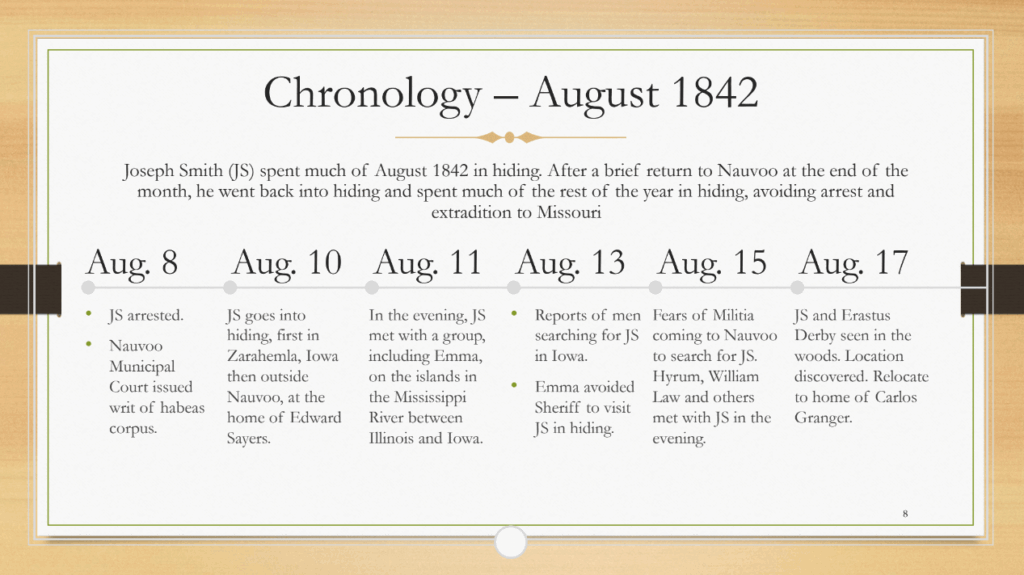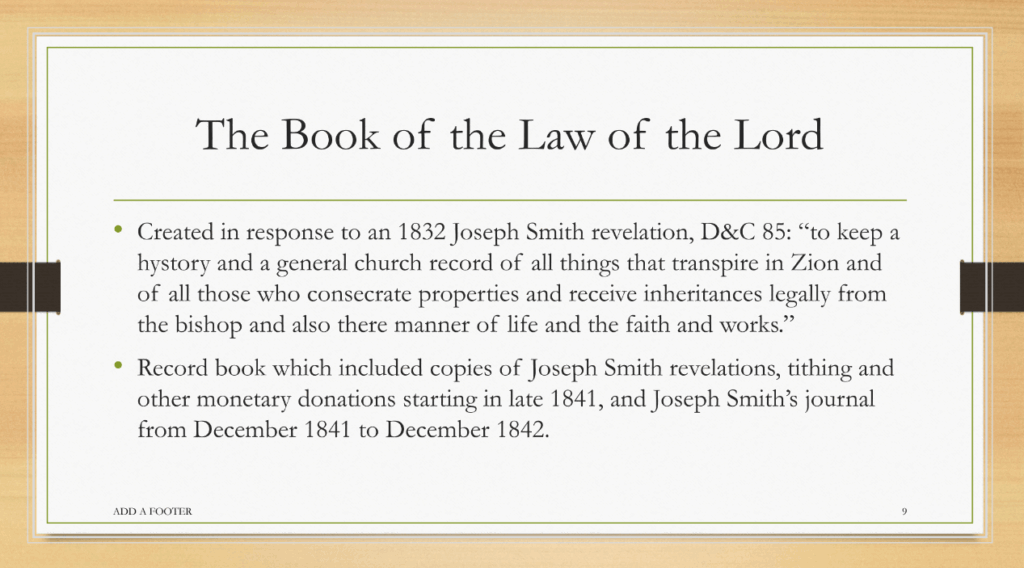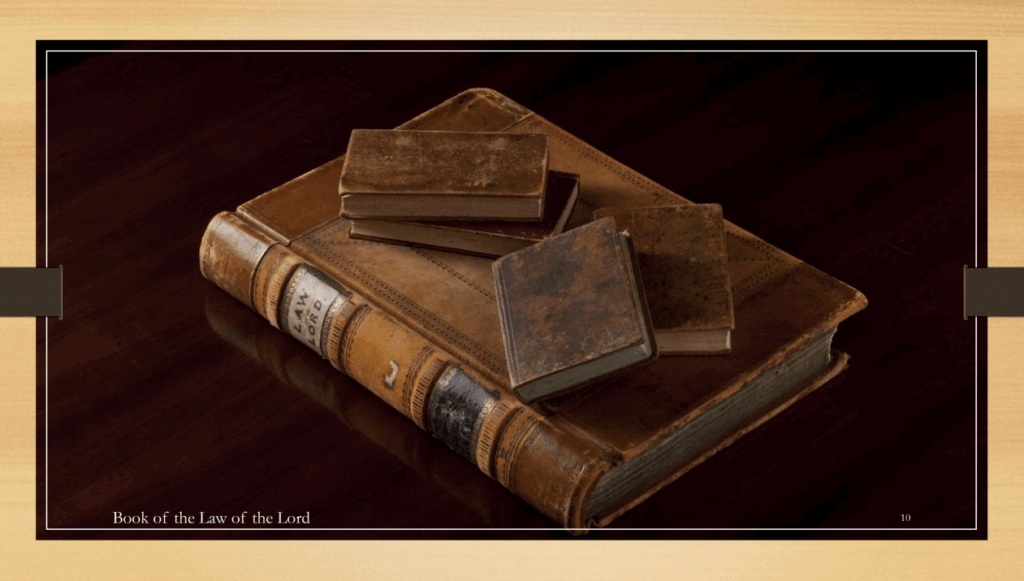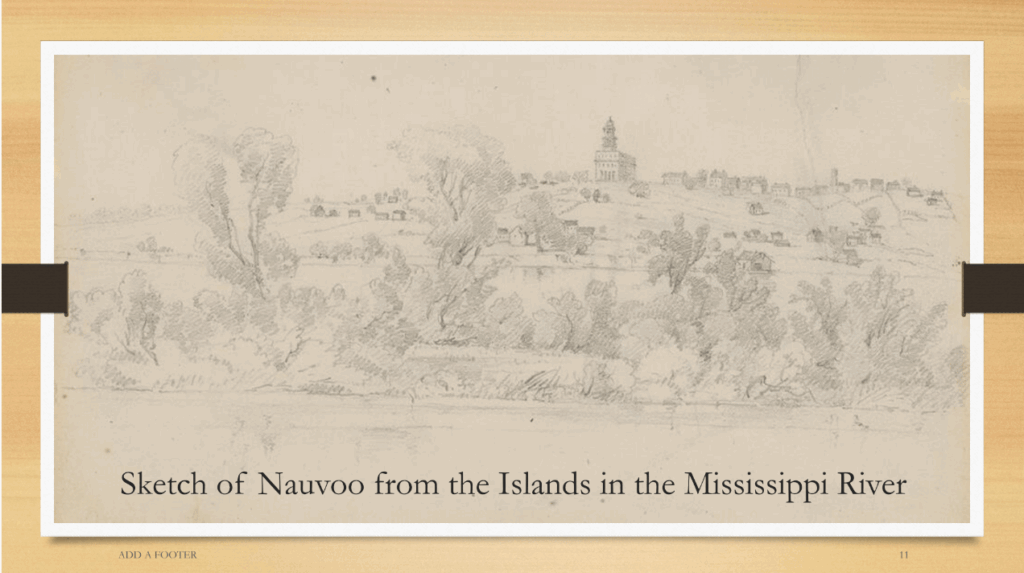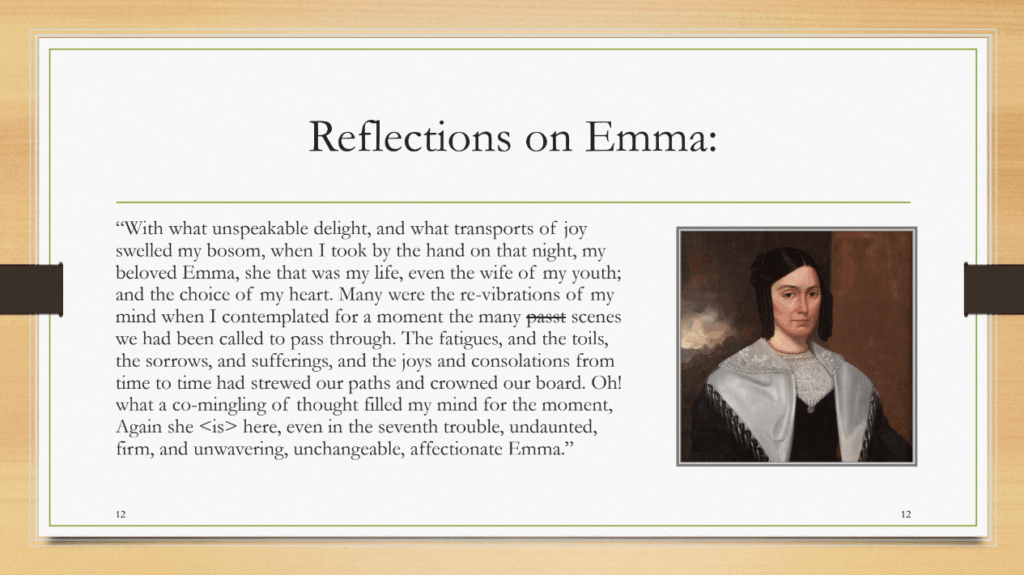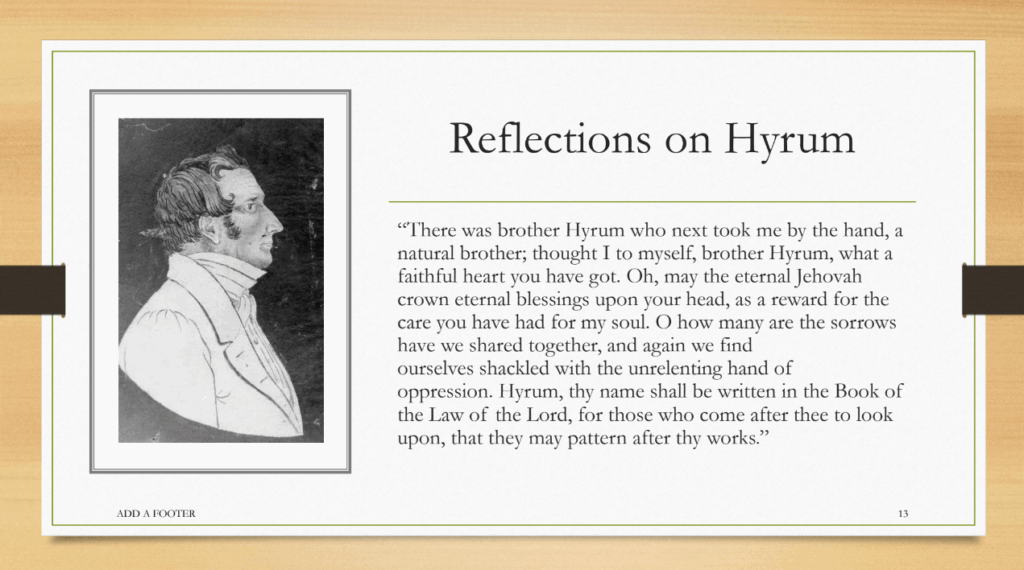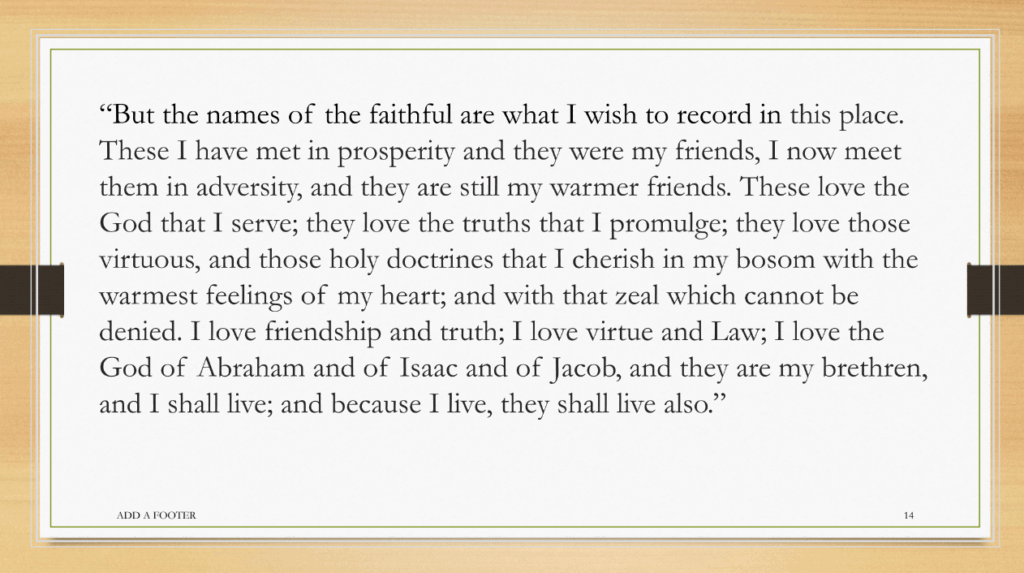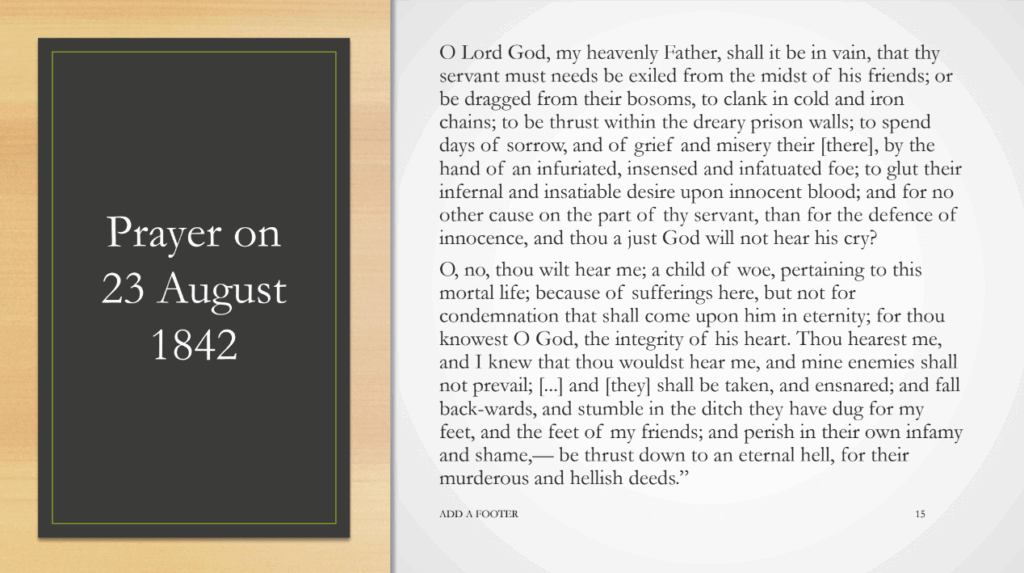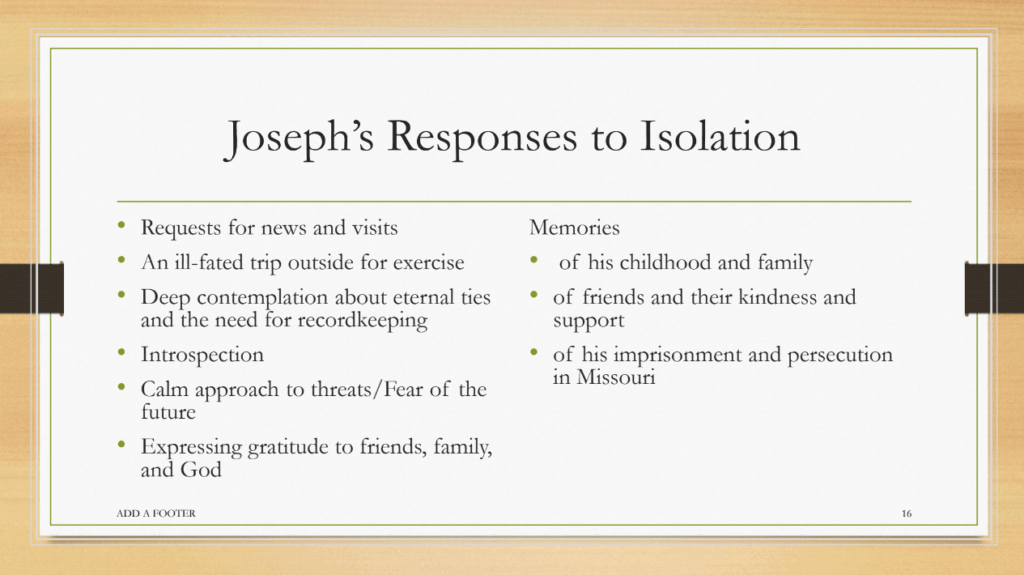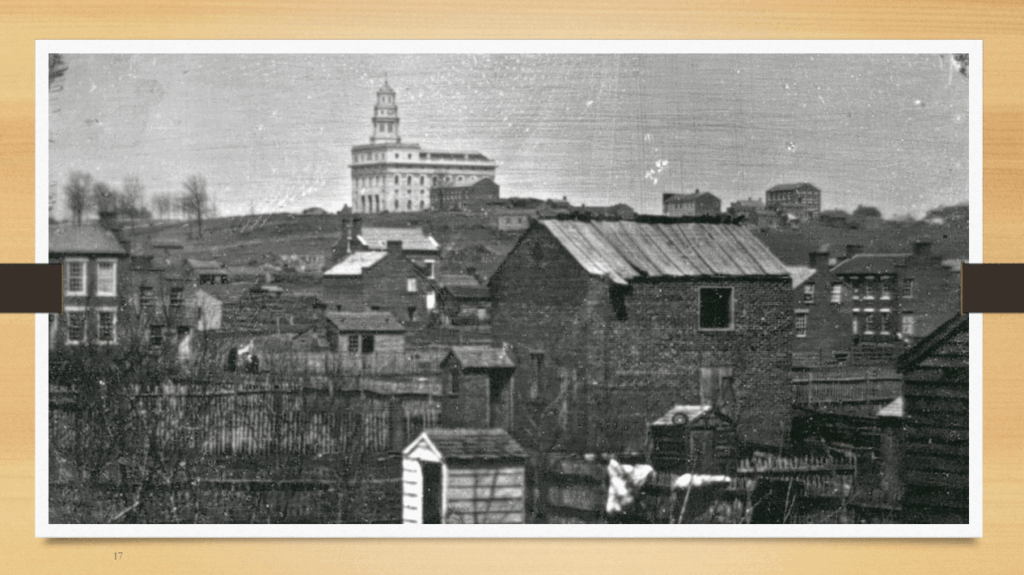Summary
In her presentation, Elizabeth Kuehn reflects on Joseph Smith’s life during the summer of 1842, a period marked by intense trials, including his time in hiding due to threats of extradition to Missouri. She explores how Joseph balanced his overwhelming civic and religious responsibilities with the challenges brought by the betrayal of John C. Bennett and highlights Joseph’s deep introspection during his isolation.
This talk was given at the 2020 FAIR Annual Conference on August 5, 2020.

Elizabeth Kuehn is a historian and lead editor on the Joseph Smith Papers Project. She provides context on Joseph Smith’s challenges in the summer of 1842, including political persecution, Church governance issues, and personal introspection.
Transcript
Introducing Elizabeth Kuehn
Scott Gordon: Our next speaker, Elizabeth Kuehn, is a historian. She’s worked as a documentary editor and historian on the Joseph Smith Papers Project based in the Church History Library in Salt Lake City, Utah, and is co-editor on several volumes of documents and papers. She’s currently the lead editor of the financial records series in the Joseph Smith Papers Project. And at this time, I’m going to turn the time over to Elizabeth.
I have had the privilege of working as a historian on the Joseph Smith Papers project for the last seven years. It seems that every time I work on a new volume, covering a different period in Joseph Smith’s life, I see challenges and difficulties. In so many ways, the themes I used in the title of my presentation – trials, tenacity, and gratitude – are well documented over the course of his life. Anyone studying about Joseph Smith can think of numerous instances of each, many of which were defining moments for him.
While I readily acknowledge that these themes are by no means limited to the summer of 1842; yet, I think they help us understand some of the key elements of this momentous summer and what it meant to Joseph Smith and other Latter-day Saints.
Elizabeth Kuehn
Insights From Joseph Smith’s Life in the Summer of 1842: Trials, Tenacity, and Gratitude
Presentation
Thank you. It’s good to be with you today. I’ve had the privilege of working as a historian on the Joseph Smith Papers Project for the last seven years. It seems that every time I work on a new volume covering a different period in Joseph Smith’s life, I see new challenges and difficulties. In so many ways, the themes I use to title this presentation, “Trials, Tenacity, and Gratitude,” are well documented over the course of his life. Anyone studying about Joseph Smith can think of numerous instances of each, many of which were defining moments for him. While I readily acknowledge that these themes are by no means limited to the summer of 1842, yet I think they can help us understand some of the key elements of this momentous summer and what it meant to Joseph and the other Latter-day Saints.
My presentation today is relevant and, I hope, timely for multiple reasons. For one thing, I am excited to focus my remarks today on the most recently published volume of the Joseph Smith Papers, Documents Volume 10, which covers the period from May to August 1842. I served as lead editor on this volume and was fortunate to work with a wonderful team of historians and editors. In all of the challenges of the past months, I would not be surprised if this volume slipped your notice when it was released in May. But I hope to highlight today some of the insights found in its pages about the life and character of Joseph Smith.
Insights
Some of these insights feel very timely themselves, as Joseph spent much of 1842 in hiding, isolated from his family and friends, as he avoided attempts to arrest and unjustly extradite him to Missouri a second time. While I appreciated Joseph’s thoughts and actions during this period when I first started working on the volume several years ago, the recent pandemic and isolation it has brought have made them far more meaningful and instructive. I think his sense of loneliness, his need for communication, and his introspection, are things we are all now a little more familiar with after the last several months.
During Joseph’s time in hiding in August 1842 he dictated a series of profound and eloquent blessings and recollections in order to have them written in a record book called the Book of the Law of the Lord. These personal reflections offer a glimpse into his memories and his immense gratitude for the friends and family who supported him through the many trials he faced over the course of his life.
Chronology of the Summer of 1842
My presentation today will contextualize the summer of 1842 and the developments that led Joseph Smith to go into hiding for first weeks, then months as well as the challenges he and the Saints faced at this time. It will also highlight the different ways Joseph reacted to his time in isolation, placing particular emphasis on the blessings he dictated and the gratitude he expressed. My hope is that we can all find some aspect of this to relate to or learn from, especially in our current circumstances.
1842 was a busy year filled with significant changes and trials. You can see from the chronology of the summer shown here just how much Joseph was doing over these months. And May 1842 was an especially defining month in Joseph Smith’s life.
On May 4, he shared instructions on the priesthood with a small group of trusted men and introduced them to new ceremonies that became known as the endowment and which were eventually performed in the Nauvoo Temple.
By May 11, tensions with John C. Bennett and concerns about his sexual misconduct had increased to the point where Joseph and other Church leaders decided to excommunicate Bennett. Bennett resigned from his responsibilities and left Nauvoo, shifting from being Joseph’s supporter and ally to his vehement opponent.
A third defining event in May, was an assassination attempt on former Missouri governor Lilburn W. Boggs by an unknown assailant. Rumors began to circulate that the assassin had been sent by Joseph Smith, which prompted an attempt to have him extradited to Missouri for prosecution. The repercussions of these May 1842 developments had lasting implications for Joseph Smith and the Latter-day Saints.
John C. Bennett
Soon after Bennett had moved to Nauvoo and joined the Saints, rumors reached Joseph about Bennett and certain alleged indiscretions. Understanding well the rumors that might be unfairly circulated about someone, Joseph did not leap to any conclusions. But he also did not turn a blind eye to them and asked his brother Hyrum and William Law to investigate the rumors. They discovered that Bennett did indeed have a family that he had abandoned in Ohio. They learned from his wife, Mary Barker Bennett, that John C. Bennett was a serial adulterer and had destroyed several families in Ohio as a result of his infidelity.
By fall 1841 there were additional rumors in Nauvoo that Bennett was seducing women using the justification that Joseph Smith and other Church leaders condoned extramarital sex. This led Joseph to confront Bennett. Bennett promised to reform, but by spring 1842, it was clear that he was continuing his adulterous behavior and had encouraged other men to do the same.
Bennett’s Excommunication
Realizing that Bennett had not changed, Joseph and other Church leaders signed a notice withdrawing Bennett’s fellowship in the Church and excommunicating him on May 11th. The notice was signed by the First Presidency, and by most members of the Twelve Apostles. The notice was not published or made public until a month later, on June 15, when it was printed in the Times and Seasons newspaper.[1]
On May 17, 1842 Bennett resigned as Mayor of Nauvoo and requested that his name be removed from the records of the church.[2] Two days later, on May 19, Joseph was elected mayor by the Nauvoo City Council.[3] Joseph had been an active member of the city council since its formation, serving on several committees, and working to pass city ordinances and resolutions.
But the role of mayor added significantly more work to an already staggering list of responsibilities – listed here. As part of Joseph Smith’s mayoral role, he was also commissioned as a justice of the peace and presided over the local courts in Nauvoo. In June, Wilford Woodruff wrote in a letter to fellow apostle Parley P. Pratt that he had “never seen Joseph as full of business as of late,” noting that “he hardly gets time to sign his name.”[4] Of course, Joseph had help with many of these roles, sometimes relying heavily on scribes and clerks to do the work on his behalf. But I think we often fail to realize just how central he was to the community of Nauvoo, not only in religious or ecclesiastical matters but also in civic and municipal ones.
Investigating Sexual Misconduct
Bennett’s impact continued to be felt in Nauvoo even after his excommunication. In late May 1842, the Nauvoo High Council began investigating sexual misconduct among members of the Church in Nauvoo and realized that it was not limited to Bennett. Wilford Woodruff’s journal entry for May 27th notes:
The First Presidency, The Twelve and High Council and virtuous part of the Church are making an exertion about these days to cleanse the Church from adulterers, fornicators, and evil persons, for their are such persons crept into our midst. The High Council have held a number of meetings of late and their researches have disclosed much iniquity, and a number have been cut off from the Church.”[5]
Over the course of the High Council’s investigations, several women provided affidavits attesting to the actions of Bennett and other men in the community. Ultimately, three men were disfellowshipped because of sexual misconduct.[6]
Informing the Public
Although Bennett had been excommunicated in May, Joseph waited until mid-June to publicly condemn Bennett and air his grievances. A week later, Joseph wrote a letter to the public that was published in the two Nauvoo newspapers, the Wasp and the Times and Seasons. In this letter he informed the public about Bennett’s immoral behavior and the steps Church leaders had followed in reprimanding and excommunicating him when he failed to reform.[7]
In July, Bennett publicly in turn condemned Joseph, publishing four letters written to the editor of the Sangamo Journal, a newspaper in Springfield, Illinois.[8] These letters included allegations by Bennett that Joseph was involved in adultery, fraud, and other deceitful actions. Bennett accused Joseph of having a band of Danites in Nauvoo that he used to threaten violence against Bennett and others. Bennett also specifically claimed that Joseph had been involved in the assassination attempt on former Missouri Governor Lilburn Boggs.
Governor Boggs’ Attempted Assassination
This attempt on Bogg’s life took place on May 6, 1842. Boggs was shot several times while in his home in Independence, Missouri. News of the attack reached Nauvoo in mid-May, but the initial newspaper articles reported that Boggs had been killed. Many Latter-day Saints saw Boggs’ alleged death as a just punishment for his persecution of the Saints in Missouri.
In his journal, Wilford Woodruff recorded his thoughts on May 15th, “information has just reached us that the Noted Governor Boggs of Missouri who By his orders expelled ten thousand Latter Day Saints, Has just Been assassinated in his own house & fallen in his own Blood.” Woodruff concluded: “Thus Boggs hath died as a fool dieth & gone to his place to receive the reward of his works.”[9] Woodruff and his fellow Saints eventually learned that Boggs had survived the attempt on his life.
Joseph Smith was soon implicated in the assassination attempt. In the May 21 issue of the Quincy Whig newspaper, editor Sylvester Bartlett claimed that Joseph had prophesied Boggs’ death and suggested that the attempt was committed by a Latter-day Saint. Joseph replied to Bartlett’s claims, stating his innocence, and noting that Boggs died “with his hands and face yet dripping with the blood of murder.”[10]
But the idea that Boggs’ assailant was a Latter-day Saint continued. Bennett made the same allegation in July in his letters to the editor of the Sangamo Journal. He further claimed that Joseph had directed Orrin Porter Rockwell to kill Boggs.
Affidavit and Requisition
In late July, these accusations led Boggs to sign an affidavit accusing Joseph of being an accessory to the assassination attempt in May.[11] This in turn led Missouri Governor Thomas Reynolds to issue a requisition for Joseph Smith as a fugitive.[12]
Despite the pleas from the Saints and Nauvoo citizens, Illinois Governor Thomas Carlin issued a warrant for Joseph to be arrested and taken back to Missouri.[13] Joseph and Rockwell were arrested on August 8th but used a new ordinance passed by the Nauvoo City Council to petition for a writ of habeas corpus. Their petition was heard by the Nauvoo Municipal Court and granted.[14] Unclear about the Nauvoo courts authority and how to proceed, Sheriff Thomas King returned to Quincy for further direction. Joseph and Rockwell were released and quickly went into hiding to avoid the threatened extradition to Missouri.
Extradition to Missouri was no ideal threat, Joseph knew that he was unlikely to have a fair trial and that it would almost surely result in his death. In his letters and journal, the fear of returning to Missouri is a dark cloud looming over the extradition proceedings. Joseph wrote to Wilson Law:
I have come fully to the conclusion both since this last difficulty commenced, as before, that I never would suffer myself to go into the hands of the Missourians alive; and to go into the hands of the Officers of this state is nothing more nor less than to go into the hands of the Missourians; for the whole farce has been gotten up, unlawfully and unconstitutionally […] by a mob spirit for the purpose of carrying out mob violence.”[15]
Emma Smith’s Letter
It was perhaps Emma Smith who best encapsulated the situation in her August 16, 1842 letter to Governor Carlin. She decried the injustice the Latter-day Saints, and particularly her husband, had endured at the hands of Boggs and other Missouri officials. She pled for Carlin’s sympathy and then reminded him of the realities that Joseph faced, writing
all the design of the prosecution, is to throw him into the power of his enemies; without the least ray of hope that he would ever be allowed to obtain a fair trial, and that he would be inhumanly and ferociously murdered.”
She continued, reminding Carlin of his own words
your honor will recollect that you said to me that you would not advise Mr Smith, ever to trust himself in Missouri. And dear Sir, you cannot for one moment indulge one unfriendly feeling towards him, if he abides by your council.”[16]
One of the reasons we have the benefit of rich records for Joseph Smith during the Nauvoo period is the increased stability and professionalization of his office and staff beginning in 1841. As his various responsibilities expanded, he employed several clerks and scribes, some with professional training. He had previously relied on individual scribes with little or no training to maintain his journal, correspondence, and other Church records. Over the years, he had lost several scribes to illness, death, or disaffection, leading at times to the loss of the records they had kept.
Nauvoo
In Nauvoo, by contrast, his office expanded beyond a single individual, and by summer 1842 scribes Willard Richards and William Clayton were both working to create a professional and organized office for Joseph’s correspondence and other records.[17] They also diligently kept a journal for him. We know about the time that Joseph spent in hiding and can better understand the pressures and choices he faced because of their careful record keeping. The chronology of daily events that I will outline here is dependent on both Joseph’s journal and his saved correspondence, most of which was copied into his journal.
Joseph Smith in Hiding
By August 10, when Sheriff King returned to arrest Joseph, he could not find him. Joseph and Porter Rockwell had gone into hiding, between August 9 and 10 they were staying in Zarahemla, Iowa. In a reminiscent account written many years later, Latter-day Saint Thomas R. King remembered ferrying Joseph across the Mississippi River between Illinois and Iowa so he could visit his home and family. While Joseph returned to Zarahemla with him, Porter did not.[18]
Joseph spent August 11, at the home of his uncle, John Smith, who also lived in Zarahemla. He had sent word to Nauvoo that he wished to meet with a small group of friends and Church leaders that night, instructing them to meet on the islands in the Mississippi River between Nauvoo and Montrose, Iowa.
Joseph’s journal, kept at this time by William Clayton, related how Clayton, Emma Smith, Hyrum Smith, William Law, Newel K. Whitney, George Miller, and Dimick B. Huntington met “at the water side near the Brick Store sometime after dark and then proceeded to the islands. There they met with Joseph and Erastus Derby and held a council. The group determined that Joseph should remain in hiding, this time coming back to Illinois and hiding at the home of Latter-day Saint Edward Sayers just outside of Nauvoo.”[19]
While the journal account is rather matter of fact, this meeting stood out in Joseph’s memory and he recalled it fondly nearly a week later.
In Good Spirits
Days later, on August 13, Joseph requested that Emma visit him “that they might consult together.”[20] Emma was prepared to go, but soon found that she was being watched closely by Sheriff King, who likely hoped that she would lead him to her husband. Clayton recounted in the journal the additional effort they made that evening, as Emma first walked to Elizabeth Durfee’s home, then joined Clayton and Lorin Walker in the carriage. Then the group took a roundabout way out of the city and stopped at the outskirts before walking several miles to Sayer’s home.[21]
Clayton noted that when they arrived at Sayer’s home, they found “President Joseph in good spirits, although somewhat sick.”[22] Emma stayed overnight and spent the next day, Sunday August 14, with Joseph. The couple spent the morning talking and reading, and Clayton wrote in Joseph’s journal that “Both felt in good spirits and were very cheerful.” Joseph wrote a letter to Wilson Law, the newly elected Major General in the Nauvoo Legion, which Emma would deliver when she returned to Nauvoo.
Despite the relaxing visit Joseph had enjoyed with Emma, threats were circulating. Reports reached Nauvoo on August 13 that there were companies of men searching for Joseph in Iowa and that a reward of thirteen hundred dollars had been offered for the apprehension of Joseph and Porter Rockwell.[23]
Rumors
By August 15 rumors that the Illinois militia would come to Nauvoo worried the Saints. That evening news reached church leaders in Nauvoo that “the Sheriffs were determined to have Joseph and if they could not succeed themselves they would bring a force sufficient to search every house in the City and if they could not find him there they would search the state.”[24]
Concerned about these rumors, a group composed of Hyrum Smith, George Miller, William Law, Amasa Lyman, Jonathan D. Parker, Newel K. Whitney, and William Clayton made their way “by different routes that evening to where Joseph was hiding.”[25] Bishop George Miller suggested that Joseph consider leaving Nauvoo and making his way to an area of Wisconsin known as the Pine Country where the church had established a lumber camp.[26]
Joseph initially considered this, but he took a measured approach calming his agitated friends and concluding that he would not yet leave Nauvoo. Clayton noted in Joseph’s journal, that Joseph took this occasion to “gently reprove all present for letting report excite them, and advised them not to suffer themselves to be wrought upon by any report, but to maintain an even, undaunted mind.” Clayton further noted that the men present began to gather courage and their fears subsided and that “the greatest union and good feeling prevailed amongst all present.”[27]
Willingness to Sacrifice
But for all of Joseph’s confidence the evening of the 15th, concerns for the safety of Saints and of his family continued to trouble him and he wrote letters to Emma and Wilson Law the next day debating whether he should follow Bishop Miller’s advice and leave for Wisconsin. He felt that his absence from the area might protect the Saints. He wrote in his letter to Law,
If I knew that they would oppress me alone, and let the rest of you dwell peaceably and quietly, I think It would be the wisest plan to absent myself for a little season if by that means we can prevent the profusion of blood.”[28]
He further informed Law that he was willing to sacrifice his own liberty “for months and years without stooping to the disgrace of Missouri persecution and violence, and Carlin’s mis-rule and corruption” and that he would “bow to his fate with cheerfulness and all due deference in the consideration of the lives, safety and welfare of others.”[29]
Wisconsin
His 16th August letters further speculated on where his family would be safest. Miller had suggested that Joseph head to Wisconsin on his own and his family could be brought later, but Joseph disliked this plan. In his August 16 letter to Emma he wrote,
If I go to the Pine country, you shall go along with me, and the children; and if you and the children go not with me, I dont go. I do not wish to exile myself for the sake of my own life, I would rather fight it out. It is for your sakes, therefore, that I would do such a thing. I will go with you then, in the same carriage and on Horseback, from time to time, as occasion may require; for I am not willing to trust you, in the hands of those who cannot feel the same interest for you, that I feel.”[30]
The possibility of going to Wisconsin held some appeal for Joseph, as it offered a reprieve from the persecution and stress he faced and would allow him to spend more time with his family. He wrote Emma,
I am tired of the mean, low, and unhallowed vulgarity of some portions of the society in which we live; and I think if I could have a respite of about six months with my family, it would be a savor of life unto life, with my house.”[31]
Making Plans
Although he tried to see both sides, Joseph’s ultimate preference was to remain in Nauvoo. He wrote Emma that
if it were possible I would like to live here in peace and wind up my business; but if it should be ascertained to a dead certainty that there is no other remedy, then we will round up our shoulders and cheerfully endure it; and this will be the plan.”[32]
Having seriously considered that there might be no better option than to take his family and travel to Wisconsin, Joseph outlined detailed plans for Emma and Hyrum to follow. As part of these plans, he requested that William Clayton and Loren Walker join them, writing:
Let Loren and Brother Clayton come along and bring all the writings and papers, books and histories, for we shall want a scribe in order that we may pour upon the world the truth like the Lava of Mount Vesuvius.”[33]
Erastus Derby
Joseph had encouraged those around him not to be excited by the rumors and threats that were circulating, but he still had his own doubts and moments of despair. He wrote in a letter to Emma that he had
been kept from melancholy and dumps, by the kind-heartedness of brother [Erastus] Derby, and his interesting chit-chat from time to time, which has called my mind from the more strong contemplations of things and subjects that would have preyed more earnestly upon my feelings.”[34]
It is within this context, facing uncertainty and doubts that Joseph paused, and took a moment for reflection, remembering the friends and family who had supported and helped him in his current troubles and past trials. On August 16, he began dictating a meaningful blessing for Erastus Derby, who had spent many hours with Joseph in hiding and had acted as courier for several of his letters. He asked that Derby’s name “be had in everlasting remembrance; let the blessings of Jehovah be crowned upon his posterity after him, for he rendered me consolation, in the lonely places of my retreat.”[35]
After finishing the specific blessing for Derby, he transitioned into broader reflections focusing on the many individuals who had shown him loyalty and kindness and expressed his gratitude for them.
This expression of gratitude alone is instructive, that Joseph would turn his thoughts to his blessings in such a tumultuous time. But there is even greater significance to these blessings and reflections. They were recorded by William Clayton in a record book known as the Book of the Law of the Lord.
The Book of the Law of the Lord
This book contained Joseph Smith’s journal, tithing donations, as well as revelations. It was created in part to fulfill an 1832 instruction, now canonized as section 85 of the Doctrine & Covenants, to keep a history and general record of the Church and its members, including their faith and works.
In the 1832 letter, Joseph emphasized that the names of faithful Saints should be recorded in “the book of the Law of God.”[36] It was to this purpose then, that Joseph dictated the names and deeds of various individuals to Clayton on August 16 and 23, for them to be recorded in the Book of the Law of the Lord for their eternal benefit. As he identified their kind acts for Clayton to record, Joseph also pronounced blessings on several, asking the Lord to bless them in specific ways. Joseph reflected:
How good, and glorious, it has seemed unto me, to find pure and holy friends, who are faithful, just and true, and whose hearts fail not; and whose knees are confirmed and do not faulter; while they wait upon the Lord, in administering to my necessities; in the day when the wrath of mine enemies was poured out upon me. In the name of the Lord, I feel in my heart to bless them, and to say in the name of Jesus Christ of Nazareth that these are the ones that shall inherit eternal life. I say it by virtue of the Holy Priesthood, and by the ministering of Holy Angels, and by the gift and power of the Holy Ghost.”[37]
August 11 Meeting
The meeting that had taken place on the islands in the Mississippi River on August 11 featured prominently in Joseph’s August 16 dictation. While Joseph’s journal provided Clayton’s account of the meeting, the August 16 account offered a glimpse into Joseph’s memory of the meeting and the significance it held for him.
Joseph began by recalling a particularly poignant memory of seeing Emma that night and then reflected on their marriage and all that they had endured together.
With what unspeakable delight, and what transports of joy swelled my bosom, when I took by the hand on that night, my beloved Emma, she that was my life, even the wife of my youth; and the choice of my heart. Many were the re-vibrations of my mind when I contemplated for a moment the many passt scenes we had been called to pass through. The fatigues, and the toils, the sorrows, and sufferings, and the joys and consolations from time to time had strewed our paths and crowned our board. Oh! what a co-mingling of thought filled my mind for the moment, Again she <is> here, even in the seventh trouble, undaunted, firm, and unwavering, unchangeable, affectionate Emma.”[38]
Despite the tension that plural marriage brought to their marriage, this quote suggests how deeply Joseph loved Emma and relied on her. She was the “choice of his heart” and I find it compelling the words he used her to describe her – firm, undaunted, unwavering.
Joseph’s Notes
From Emma his thoughts then moved to his brother Hyrum, the next to embrace him the evening of the 11th. Joseph included a blessing here, asking
Oh, may the eternal Jehovah crown eternal blessings upon your head, as a reward for the care you have had for my soul. O how many are the sorrows have we shared together, and again we find ourselves shackled with the unrelenting hand of oppression.”[39]
And then, mindful of the record that was being made, he stated another intention for recording the actions of faithful Saints,
Hyrum, thy name shall be written in the Book of the Law of the Lord, for those who come after thee to look upon, that they may pattern after thy works.”[40]
Joseph then named and thanked all those present for the meeting on August 11, describing it as a “sacred night, which shall forever be remembered by me.”[41]
His gratitude even extended to those who had rowed the skiff, taking him from the islands to the riverbank near Nauvoo. He recalled that one of the rowers was Jonathan Dunham but did not know the name of the other. He recounted that
Many were the thoughts that swelled my aching heart, while they were toiling faithfully with their oars. The<y> complained not at hardship and fatigue to secure my safety. My heart would have been harder than an adamantine stone, if I had not have prayed for them, with anxious and fervent desire. I did so, and the still small voice whispered to my soul, these that share your toils with such faithful hearts, shall reigne with you in the kingdom of their God.”
Further Dictation
Joseph noted with some consternation that he had “parted with them in silence” and expressed his desire to be reunited,
I hope I shall see them again that I may toil for them and administer to their comfort also. They shall not want a friend while I live. My heart shall love those; and my hands shall toil for those, who love and toil for me, and shall ever be found faithful to my friends. Shall I be ungrateful? verily no! God forbid!”[42]
Clayton included an aside in the journal on August 16, noting that Joseph had “now quit speaking for the moment, but will continue the subject again.”[43] Joseph’s location was discovered on August 17 compelling him to leave Sayer’s home and relocate to the home of Carlos Granger for a time.[44] The evening of August 19 he returned to Nauvoo and spent a few days hiding in the upper room of his Nauvoo store before returning home.[45]
On August 23, Joseph resumed his dictation recounting the faith and works of Joseph Knight, and his sons. Before continuing, Joseph noted
There are a numerous host of faithful souls, whose names I could wish to record in the Book of the Law of the Lord; but time and chance would fail. I will mention therefore only a few of them as emblematic of those who are to numerous to be written.”[46]
After further reflections, Joseph turned his attention to those who had died, paying particular honor to his deceased father, Joseph Smith, Sr., and his brothers Alvin and Don Carlos. He offered extensive praise for his father, before noting the significance of his father’s memory,
I loved my father and his memory; and the memory of his noble deeds, rest with ponderous weight upon my mind; and many of his kind and parental words to me, are written on the tablet of my heart. Sacred to me, are the thoughts which I cherish of the history of his life, that have rolled through my mind and has been implanted there, by my own observation since I was born. Sacred to me is his dust, and the spot where he is laid. Sacred to me is the tomb I have made to encircle o’er his head.”[47]
Cries to Heavenly Father
Grateful for both parents, he offered praise as well to his mother, Lucy Mack Smith,
My mother also is one of the noblest, and the best of all women. May God grant to prolong her days, and mine; that we may live to enjoy each others society long yet in the enjoyment of liberty.”[48]
His memories of the persecution and trauma he experienced in Missouri appear to have been on his mind as he contemplated the threat of returning there. This is particularly evident in the prayer he dictated concluding his August 23 entry in the Book of the Law of the Lord. He asked God to “look down upon thy servant Joseph at this time” and asked that
faith on the name of thy Son Jesus Christ, to a greater degree than thy servant ever yet has enjoyed, be conferred upon him; even the faith of Elijah; and let the Lamp of eternal life, be lit up in his heart, never to be taken away; and let the words of eternal life, be poured upon the soul of thy servant; that he may know thy will, thy statutes, and thy commandments, and thy judgements to do them.”[49]
Joseph continued, contemplating whether his current exile would be in vain, and whether his cries for deliverance would be heard.
O Lord God, my heavenly Father, shall it be in vain, that thy servant must needs be exiled from the midst of his friends; or be dragged from their bosoms, to clank in cold and iron chains; to be thrust within the dreary prison walls; to spend days of sorrow, and of grief and misery their [there], by the hand of an infuriated, insensed and infatuated foe; to glut their infernal and insatiable desire upon innocent blood; and for no other cause on the part of thy servant, than for the defence of innocence, and thou a just God will not hear his cry? O, no, thou wilt hear me; a child of woe, pertaining to this mortal life; because of sufferings here, but not for condemnation that shall come upon him in eternity; for thou knowest O God, the integrity of his heart. Thou hearest me, and I knew that thou wouldst hear me, and mine enemies shall not prevail.”[50]
This plea for God to hear his cries and intervene, vividly recalls the chains and cold prison cell of Liberty Jail.
Joseph’s Emotions
One of my favorite aspects of the quotes I have shared with you today from the Book of the Law of the Lord is the way they capture Joseph Smith’s emotions in sometimes inflated and overly grandiose language. I wonder if because this information is being recorded officially in the Book of the Law of the Lord, that Joseph wanted to make it special, to make it sound important and eloquent. I love these passages for the imagery and wordplay, but most of all for the effort I imagine Joseph putting into them. It reminds me that he was often described as plain spoken, not someone given to extensive description or eloquence. He did not have the benefit of a classical education, but here he is waxing elaborate and eloquent as he tried to capture the depth of his love and gratitude for his friends, family, and God.
Lessons From Joseph’s Responses to Isolation
What then can we learn from Joseph Smith’s responses to isolation and loneliness? Although we might look at his time he spent in hiding in August and see multiple visits and meetings and thus assume that he was rarely lonely, Joseph often describes his time as a lonely exile. He thanked Emma for her efforts to visit him, writing:
I take the liberty to tender you my sincere thanks for the two interesting and consoling visits that you have made me during my almost exiled situation. Tongue can not express the gratitude of my heart for the warm and true-hearted friendship you have manifested in these things toward me.”[51]
When we consider just how busy he had been before this, the many responsibilities and interactions that filled his days, his time in hiding was an abrupt change. It should not be surprising that he requested visitors, news, and counsel on the weighty decisions he was trying to make. In a letter to Wilson Law, he wrote,
I have no news for I am where I cannot get much all is quiet and peaceable around. I therefore wait with earnest expectation for your advice, I am anxious to know your opinions on any course that I may see proper to take, for in the multitude of council there is safety.”[52]
By August 17, Joseph appears to have felt a need for more activity, perhaps he was going a bit stir-crazy as he stayed cooped up inside. He and Erastus Derby went into the woods near Sayer’s home “for exercise” and were spotted by a young man, thought to be Martin Harris Henderson. They asked the young man about the state of things in Nauvoo and requested that he not divulge their location.
Memories While in Hiding
But rumors circulated in Nauvoo later that day, and Emma came to warn Joseph that his location had been discovered. He then moved to the home of Carlos Granger in the northeastern part of Nauvoo.[53]
During his time in hiding, Joseph remarked on the many memories that had come to mind.
And since I have been hunted by the Missourians many are the scenes which have been called to my mind. Many thoughts have rolled through my head, and across my breast. I have remembered the scenes of my child-hood.”[54]
In an August 16 letter to Emma, Joseph again connected to childhood memories. He remarked that on the proposed trip to Wisconsin,
we will wend our way like larks up the Mississippi untill the touring [towering?] mountains and rocks, shall reminds us of the places of our nativity, and shall look like safety and home; and then we will bid defiance to the world.”[55]
But his memories also included the chains and prisons of Missouri, and the helplessness of imprisonment while his family and friends suffered. In contrast, he also remembered the kindness that so many individuals had shown him. His memory of Joseph Knight included aid that Knight had offered Joseph and his family years earlier
while I was laboring, in the commencement of the bringing forth of the work of the Lord, and of laying the foundation of the Church of Jesus Christ of Latter Day Saints.”[56]
Revelations
As shown by the blessings and reflections recorded in the Book of the Law of the Lord, this time in hiding was also a period of deep thought and introspection for Joseph. Though determined to avoid extradition to Missouri, including arrest by Illinois officials, Joseph appears to have tried to come to terms with the situation. In a letter to Emma he wrote that
The time has passed away since you left me, very agreeably; thus far, my mind being perfectly reconciled to my fate, let it be what it may.”[57]
This reconciliation did not translate into disinterest and he made detailed plans for Emma should they go to Wisconsin and likewise for Wilson Law and the Nauvoo Legion. He informed Law that his plans were “the result of a long series of contemplation since I saw you.”[58]
This contemplation also touched on the doctrines of eternity. In his August 16 letter to Emma he mentioned that he had had dreams and visions, though he did not mention the subject or any other details.[59] He seems to have spent much of his time on his own deep in thought.
Although he did not mention it until after he had returned to Nauvoo in late August, Joseph spent some of this time refining instructions for baptisms for the dead, including the importance of record keeping. He first mentioned having new instructions for the Saints when he spoke to the Relief Society in Nauvoo in late August.[60]
Temple Revelations
In early September, he shared brief instructions regarding appointing a recorder to witness and record proxy baptisms with the entire Church, but informed the Saints that he had more to share with them on the subject. His September 1st letter noted his disappointment at not being able to give these instructions in person as he had been compelled to go back into hiding, but he promised instead to “write the word of the Lord from time to time” and send it to them.[61]
He sent another letter, this one significantly longer, a week later on September 7. This letter, now canonized as section 128 in the Doctrine & Covenants, echoed many of Joseph’s earlier ideas found in his dictations in the Book of the Law of the Lord. Like his August blessings and reflections, this letter established ties of eternal importance through written records. Concerning the doctrine of sealing that “whatsoever you bind on earth shall be bound in heaven, and whatsoever you loose on earth shall be loosed in heaven,” Joseph offered a “different view of the translation,” namely that “whatsoever you record on earth shall be recorded in Heaven; and whatsoever you do not record on earth, shall not be recorded in Heaven.”[62] Thus, the process of recording became a matter of eternal significance, able to redeem the living and the dead.
Celebrating this, the letter affirmed:
Brethren, shall we not go on in so great a cause Go forward and not backward. Courage brethren; and on—on to the victory. Let your hearts rejoice and be exceeding glad. Let the earth break forth into singing. Let the dead speak forth anthems of eternal praise to the king Immanuel; who hath ordained before the world was that which would enable us to redeem them out of their prisons; for the prisoner shall go free.”[63]
Conclusion
Times of isolation or loneliness can be trying. They can also be moments of great insight and introspection. These are not mutually exclusive, and Joseph Smith experienced both in August 1842.
I hope my remarks today have offered some new insight into Joseph Smith’s life or character, a point of connection, or perhaps inspiration for navigating our current challenges.
Audience Q&A
Scott Gordon:
Welcome to our socially distanced question area. The first question that has come up is: as a historian, how important is it for us to keep detailed journals, because the level of detail seems pretty high?
Elizabeth Kuehn:
Journals are one of our best ways of knowing the everyday details of life, and Wilford Woodruff is kind of our preeminent record keeper. And, he’s particularly wonderful because you get both these kind of moments of deep reflection where he takes a moment and kind of gives some of his inner thoughts and works through his ideas, but mostly he’s just kind of logging his day-to-day efforts, right? Working in the printing office, paying his tithing, writing a letter. So sometimes, if you just spend a couple sentences describing what you did that day or what held significance for you, historians can make a lot of that in kind of a larger spectrum.
Scott Gordon:
So, you really think it’s important for us to keep a journal then?
Elizabeth Kuehn:
I do. I’m guilty of not keeping a good one. I think it’s a challenge, but when you do, it’s an amazing source for both your posterity to use and for historians and scholars.
Scott Gordon:
I do have a couple more here. Who were the other known conspirators with John C. Bennett, and what became of them following Church sanction?
Elizabeth Kuehn:
Are these referring to the seduction in Nauvoo?
Scott Gordon:
I think they must have been referring to that.
Elizabeth Kuehn:
So, there’s a handful. I don’t remember them all by name. I’ll have to direct the question to Volume Document 10 in the JSP, where we do name all those involved, as well as the women who gave affidavits, so you can kind of reconstruct both sides of the story.
Scott Gordon:
Just a personal thought, I think it’s kind of amazing that we have these women coming forward and testifying about these types of things, knowing full well, in the environment of the 1800s, how that might reflect on them. What do you think about that?
Elizabeth Kuehn:
Absolutely. One of my co-workers, Jenny Reeder, has found that the mother of two of the younger women that were involved in the Nauvoo seductions was kept from joining the Relief Society later in Utah because of this kind of stain on the family reputation. So there is a lasting effect of this, especially to the detriment of these women.
Scott Gordon:
Wow. So what do you think was the most influential event on Joseph in the summer of 1842? That’s what the question asks.
Elizabeth Kuehn:
I don’t know if I can pick one. I mean, Bennett’s ex-communication leads to so many problems for Joseph, and so Bennett in a lot of ways stands out as kind of the preeminent challenge. I mean, even today, so many of the ways that we think about plural marriage are colored by Bennett’s accusations from the 1840s. So maybe Bennett, but there’s so much happening of significance here, right? He’s teaching men the endowment, he’s building on the baptisms for the dead, he’s doing things of great doctrinal importance while also being very worried that he’ll be taken back to Missouri because of the attempt on Bogg’s life that is used to try to extradite him.
Scott Gordon:
So, going along with that, what would you say to someone who is struggling with the episode with John C. Bennett? How could a prophet of God be deceived by someone so unsavory?
Elizabeth Kuehn:
Well, I think we have to understand that Joseph wasn’t perfect. He found people charismatic and compelling, and Bennett definitely approached him that way. Bennett talks a good game for a while; he’s very helpful and he becomes mayor of Nauvoo because of his influence, because of his own charisma. So, I think we have to kind of measure all of that, take all of that into account, and realize that even though Joseph was kind of reluctant to believe the rumors that had come forward about Bennett, he didn’t ignore them. He did look into them, and he did ultimately, condemn Bennett for his actions and excommunicate him from the Church. So, yes, there are moments where he didn’t make the wisest of choices, but ultimately, I think he saw Bennett’s true colors.
Scott Gordon:
So, if you take out the unsavory portion of John C. Bennett, if you just removed that, did John C. Bennett actually make a positive contribution to the Church? Not counting those other things?
Elizabeth Kuehn:
He’s very important in getting the charter passed for Nauvoo, and he is also very important in terms of helping Nauvoo create, kind of a municipal government. So, in those ways, he does do things that are quite important and influential. But at the same time, there’s a lot of unsavory aspects to him, and you can’t brush those aside easily.
Scott Gordon:
And then with Joseph Smith, here we have a prophet of God. He’s someone who’s talked with God; he’s obviously been in God’s favor at some point at least. And yet, this seems like a really lonely time for him, and it seems like bad things are happening. What can we learn from that?
Elizabeth Kuehn:
Well, hopefully, my presentation touched on some of those. I think Joseph is very good at trying to find the positive aspects here. I think it’s very, very telling that he turns to gratitude, he turns to his blessings, he turns to remembering all of the many ways that not only God, but God through his family and friends, has blessed his life. And so, I think it’s hard; we can’t always be positive all the time, and Joseph wasn’t positive all the time either, as hopefully these quotes showed. But I think if we can find a balance there and not be weighed down by melancholy, as Joseph would say, but to rely on our family and friends—you know, one of the things that he starts his August 16th blessing with is just how important Erastus Derby, one of his sole companions in hiding is, to have someone to distract him, to have someone to rely on, to have someone there with him.
Scott Gordon:
Here’s the next question: Although the revelations are in a different series, what was your favorite theological or spiritual nugget from the documents in this volume? Good luck with that one.
Elizabeth Kuehn:
That is a hard choice. So, there’s actually quite a bit about plural marriage in this volume. I didn’t speak about it today, but that research and kind of learning the small amount that we can get from Joseph himself about plural marriage, was actually an important nugget for me. I don’t know if it was my absolute favorite; it was definitely a challenge to work on as a historian and as a woman in the Church, but I think that was probably the one that will stay most in my mind and memory.
Scott Gordon:
Okay. You clearly showed that Emma Smith was immensely influential on Joseph. In your research, did you learn any new insights on Emma Smith?
Elizabeth Kuehn:
I don’t think there were any particularly new insights. I do adore that quote that I read; I just think it’s one of the best ways to see their relationship, to see how close they were even with the tension, even with all the struggles that, especially plural marriage brought to their relationship. I just love the idea that she’s the choice of his heart; I love that phrase for Emma. And I also really love how much he clearly relies on her; he’s so relieved to have her back with him, to have her presence. And I think it’s really telling that over the course of these two weeks that Joseph spends in exile in August, that Emma is the one that’s mentioned the most; she’s the one that he desperately wants to see and consult with and spend time with. And so, I find that compelling too. Also, he’s in hiding later in the fall and winter of 1842, and Emma gets very sick, and he actually leaves hiding because he wants to be there at her bedside when she’s ill and to help take care of her.
Scott Gordon:
I really like that insight; that’s really good. That’s our last question. I want to thank you for your presentation and thank you for the time you spent with us and thank you for all the work you do on the Joseph Smith papers. Thank you very much.
Elizabeth Kuehn:
Thank you.
Endnotes & Summary
Historian Elizabeth A. Kuehn examines Joseph Smith’s life during the summer of 1842, a time marked by deep personal trials, civic responsibility, betrayal, and spiritual insight. Drawing from Documents Volume 10 of the Joseph Smith Papers Project (which she led), Kuehn highlights how Joseph faced public attacks—particularly from former ally John C. Bennett—and navigated intense legal threats, including attempts to extradite him to Missouri. Amidst this turmoil, Joseph went into hiding, reflected on the loyalty of close friends and family, and expressed profound gratitude in the Book of the Law of the Lord. Kuehn presents Joseph not as an untouchable icon but as a deeply human, thoughtful, and spiritual man working to lead and protect his people.
Main Points
- Historical context: Focus on May–August 1842 during Joseph Smith’s life in Nauvoo.
- Bennett’s betrayal: John C. Bennett, once a trusted Church and civic leader, is excommunicated after immoral conduct.
- Boggs assassination attempt: Joseph is accused of involvement, triggering extradition threats from Missouri.
- Legal persecution: Joseph goes into hiding to avoid being forcibly returned to Missouri where he feared death.
- Family support: Emma Smith plays a key role in visiting and protecting Joseph during his isolation.
- Reflections and blessings: While hiding, Joseph dictates profound blessings for friends and family in the Book of the Law of the Lord.
- Themes of gratitude: Joseph expresses deep appreciation for faithful Saints and emphasizes the eternal value of loyalty and love.
- Doctrinal development: During this time, Joseph refines teachings about record-keeping, baptisms for the dead, and sealing ordinances—culminating in D&C 128.
- Personal introspection: Joseph’s isolation prompted deep self-reflection, blending spiritual insight with emotional vulnerability.
- Prophetic humanity: The talk humanizes Joseph, portraying his leadership amid suffering and uncertainty.
All Talks by This Speaker
coming soon…
Talk Details
- Date Presented: August 5, 2020
- Duration: 47:34 minutes
- Event/Conference: 2020 FAIR Annual Conference (FairMormon)
- Topics Covered: Joseph Smith, summer 1842, John C. Bennett, betrayal, Nauvoo, endowment, priesthood, Lilburn W. Boggs, assassination attempt, Missouri extradition, Emma Smith, civic duties, Nauvoo mayor, Nauvoo City Council, isolation, hiding, loyalty, friendship, gratitude, Book of the Law of the Lord, blessings, personal reflection, record keeping, sealing, baptisms for the dead, Doctrine and Covenants 128, persecution, prophetic humanity, historical context, emotional resilience, Church discipline, sexual misconduct, Nauvoo High Council, scribes and clerks, Joseph Smith Papers, plural marriage context, Erastus Derby, Hyrum Smith, Joseph Knight, Wilford Woodruff, Lucy Mack Smith, family relationships, spiritual insight, revelation, loneliness, adversity
Common Concerns Addressed
Joseph Smith was deceived by John C. Bennett.
Kuehn explains Joseph’s cautious approach, ultimate discernment, and decisive action against Bennett.
Joseph Smith’s life doesn’t reflect that of a prophet.
The summer of 1842 shows Joseph navigating persecution with tenacity and spiritual insight, paralleling biblical prophetic experiences.
Apologetic Focus
Human fallibility and prophetic growth
Historical transparency from primary sources
Reframing isolation as a time of revelation
Explore Further
coming soon…
Share this article
